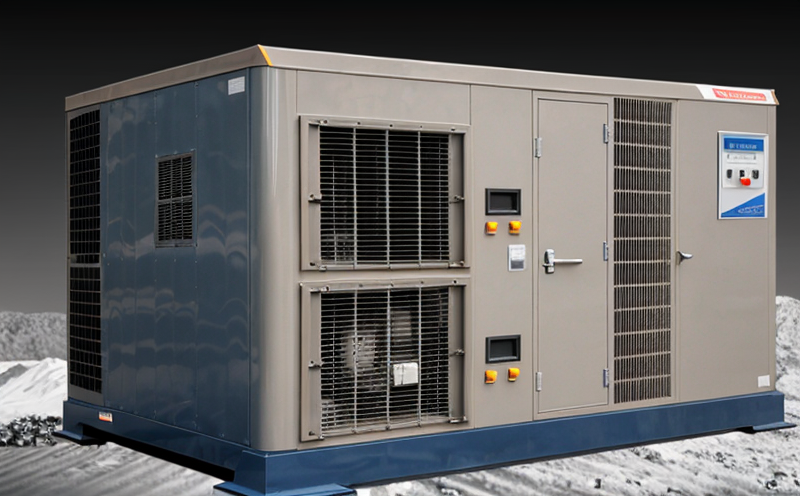IEC 60068-2-64 Random Vibration with Temperature Stress Testing
The IEC 60068-2-64 test, also known as the Random Vibration with Temperature Stress Test, is a crucial procedure for assessing the durability and reliability of electronic components, particularly semiconductor devices and microchips. This test evaluates how well a specimen withstands mechanical stress under varying temperatures to ensure it operates reliably in real-world conditions.
This type of testing involves subjecting a component to random vibrations at various temperature levels, simulating the harsh environmental conditions that could occur during manufacturing, transportation, or operation. The IEC standard specifies a range of frequencies and amplitudes within which these tests must be conducted, ensuring consistent and repeatable results.
The test setup typically includes an environmental chamber capable of maintaining precise control over temperature and humidity levels, as well as a vibration testing machine that can generate random vibrations across the required frequency band. Specimens undergo both high-temperature and low-temperature cycles while experiencing varying levels of acceleration during each cycle.
Preparation for this test is critical to ensure accurate results. Proper specimen preparation includes cleaning the device thoroughly, ensuring no foreign materials are present that could affect measurement accuracy or influence the outcome. Additionally, any connectors should be securely fastened before testing begins. Once prepared, specimens are placed into the environmental chamber where they undergo controlled temperature cycling and vibration.
The test parameters for IEC 60068-2-64 include specific frequency ranges, amplitude levels, duration of exposure to each condition, and transition times between different conditions. These stringent requirements ensure that all components being tested experience realistic stressors without overexposure or insufficient challenge.
Data collection during this test is essential for evaluating performance under these stressful conditions. Sensors placed throughout the setup measure various aspects such as displacement, acceleration, force distribution, and temperature variations. The collected data provides valuable insights into potential weaknesses within a design that might not be apparent otherwise.
After completing all cycles specified by the standard, engineers analyze the gathered data to determine whether the specimen meets acceptance criteria outlined in IEC 60068-2-64. If any failures are observed, further investigation may be necessary to identify root causes and implement corrective actions if required.
The importance of this testing cannot be overstated; it helps manufacturers ensure their products can perform consistently across diverse environments while maintaining high quality standards. By adhering strictly to the procedures defined in IEC 60068-2-64, labs like ours provide reliable data supporting product development and quality assurance efforts.
Understanding how this test contributes to overall product reliability is key for stakeholders involved in R&D or compliance roles within semiconductor industries. It ensures that every aspect of the manufacturing process is optimized towards producing robust components capable of surviving extreme conditions without compromising performance.
Customer Impact and Satisfaction
Conducting thorough thermal and environmental stress tests such as IEC 60068-2-64 ensures that semiconductor manufacturers produce products with superior durability and reliability. This not only enhances customer satisfaction but also fosters trust in the brand.
Customers appreciate knowing their devices will function correctly even after experiencing severe shock, vibration, or temperature fluctuations during transport or use. By investing in rigorous testing protocols like IEC 60068-2-64, companies demonstrate a commitment to delivering top-notch products that meet international standards.
The results from these tests provide valuable feedback for ongoing product improvement initiatives. Engineers can identify areas needing enhancement based on failure modes observed during the test process. This iterative approach leads to better-performing electronics designed specifically with durability in mind.
Moreover, adhering to global standards like IEC ensures compatibility across different markets and regulatory requirements worldwide. As more countries adopt international guidelines for quality assurance, compliance becomes increasingly important for export businesses operating internationally.
In summary, implementing thorough thermal & environmental stress testing enhances customer confidence while promoting continuous improvement efforts aimed at creating robust semiconductor solutions.
International Acceptance and Recognition
The International Electrotechnical Commission (IEC) 60068-2-64 standard has gained widespread acceptance among various industries due to its rigorous approach towards ensuring product reliability under extreme conditions. Its use spans across multiple sectors including automotive, aerospace, defense electronics, consumer electronics, and more.
Compliance with this standard is essential for manufacturers who want their products to meet stringent quality assurance criteria set by international regulatory bodies. Many countries have incorporated IEC 60068-2-64 into national legislation or guidelines, making it a de facto requirement for exporting goods internationally.
The global recognition of the IEC standard reflects its credibility and reliability as an authoritative source for best practices in environmental stress testing. Organizations like ISO (International Organization for Standardization), ASTM (American Society for Testing and Materials), and EN (European Norms) have referenced or incorporated parts of this standard into their own specifications.
By aligning with these internationally recognized standards, labs such as ours not only enhance our reputation but also provide clients with peace of mind knowing they are receiving high-quality testing services that meet global expectations.
Use Cases and Application Examples
- Aerospace Electronics: Ensuring satellite components can withstand launch vibrations and space environments.
- Automotive Industry: Verifying durability of automotive electronics in various climate conditions.
- Medical Devices: Testing implantable medical devices for robustness against thermal shock.
- Consumer Electronics: Evaluating smartwatches and other wearables for their ability to handle user-induced shocks.
- Military Applications: Assessing communication equipment in harsh battlefield scenarios involving extreme temperatures and vibrations.
- Industrial Automation: Confirming the reliability of industrial sensors used in manufacturing processes subjected to constant vibration.
In each case, performing IEC 60068-2-64 ensures that the electronic components will perform reliably under real-world conditions. This testing is particularly vital for industries where failure can lead to significant financial losses or safety concerns.
For instance, in aerospace applications, any malfunction could result in catastrophic failures leading to loss of life and property damage. In automotive manufacturing, ensuring reliable performance during transportation is crucial for maintaining brand reputation and customer satisfaction.
The use cases extend beyond just new product introductions; they also apply to ongoing quality control processes where existing products need periodic validation tests to confirm continued compliance with stringent standards.





